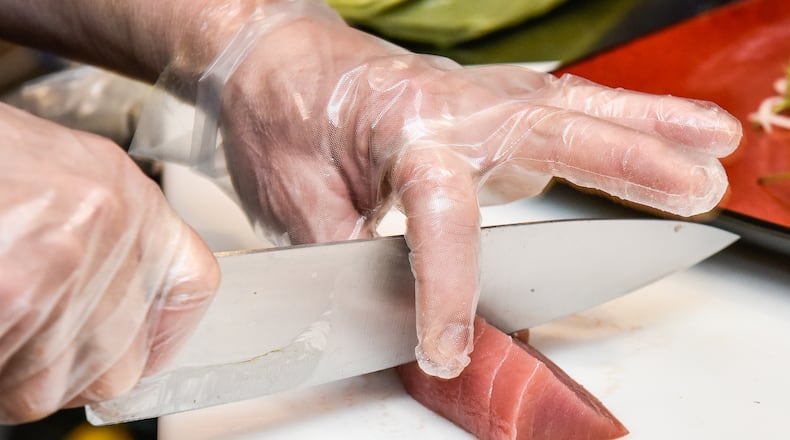“We feel it’s good to help the community and give back to those in need,” said Fred Pfeiffer, a Dorothy Lane Market store director.
The issue was highlighted recently in a study funded by the U.S. Department of Agriculture, which found the average American wastes about a pound of food each day.
RELATED: Frosé at Taco Bell? Restaurant tries to lure millennials with frozen rosé wine
John Woodman, a program specialist at the Montgomery County Solid Waste District, said about half a million tons of waste pass through the county transfer facility on its way to landfills each year. Fifteen percent of the waste is food, according to the facility’s 2015 survey.
Businesses can cut back on food waste by tracking inventory, donating leftover food and composting food waste, but composting and donating food is relatively rare among restaurants. According to a National Restaurant Association report, about 22 percent of surveyed restaurants donated leftover food and 14 percent composted food waste.
Dorothy Lane Market partners with The Foodbank to donate leftover food. A truck stops by to collect food once per day, but on some days there isn’t much to donate, Pfeiffer said. On other days, the store might donate a large amount of bread too old to sell in the bakery, and sometimes the store donates dairy products approaching their sell-by date.
Altogether, Dorothy Lane Market stores donate $35,000 worth of food each month. The food might not be fresh enough to keep on shelves, but is still safe and edible.
Dorothy Lane Market is one of 60 local merchants that donate to The Foodbank, said The Foodbank CEO Michelle Riley. The organization accepts more than six trucks of food per day from local businesses, and those donations make up 30 to 40 percent of food donated to the pantry. The organization donated 11 million pounds of food last year.
Riley said The Foodbank accepts “anything and everything,” including produce that’s been deemed too ugly to sell, frozen meat and paper products. The staff does turn away food if it may have been stored at an unsafe temperature during transport, she said.
RELATED: The tomato on your Wendy’s burger will be grown in an American greenhouse in 2019
Other restaurants reduce waste by allowing employees to take home extra food. Jack Skilliter, head chef of Corner Kitchen, said employees are free to take home leftover food as long as it’s still safe to eat. The restaurant also provides a meal to staff every day, which allows if to repurpose food that could otherwise go to waste.
The remaining food waste is mostly inedible, such as vegetable trimmings, Skilliter said. The restaurant is looking into composting.
“It’s just hard, being in the center of the city, to find a place to store that compost,” he said.
Reza’s Roast, a specialty coffee company in Fairborn, has managed to become nearly waste-free by composting and donating, said owner Audria Maki.
As coffee beans roast, a layer of the bean called “chaff” separates. Many coffee roasters discard the chaff, but Maki learned the chaff could be composted. Chaff adds nitrogen to soil, which benefits plants including tomatoes and roses. Reza’s Roast now gives away the chaff for free to people who garden.
“Well, if it’s useful and it’s just sitting around, it’s a waste,” Maki said.
RELATED: Dorothy Lane Market files permit for $300K project
Because the company sells specialty coffee, it only sells beans within two weeks of roasting them. Instead of trashing them, it donates to places such as churches that need coffee.
According to the National Restaurant Association, inventory control is the most common way restaurants address food waste, and 41 percent use those techniques.
Credit: Wheat Penny
Credit: Wheat Penny
At Wheat Penny Oven and Bar, a restaurant on Wayne Avenue in Dayton, owners pay special attention to inventory and buy seasonally, co-owner Liz Valenti said. The restaurant serves many specials, which allows it to repurpose extra ingredients that would otherwise go to waste.
Cauliflower steaks are part of the menu. Valenti said the owners work in the kitchen with the staff and watch to make sure no one trims more cauliflower than is necessary.
Staff members also think of ways to put leftover scraps to use, she said. The herbs that don’t look good enough to serve go into sauces. Leftover basil goes into a basil simple syrup that the restaurant uses in a cocktail.
The three owners are “green-focused,” Valenti said.
“I think we all care about the environment,” she said. “It’s just part of being a human.”
About the Author


